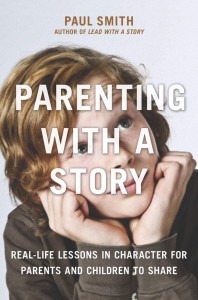Podcast: Play in new window | Download | Embed
Subscribe: RSS
Podcast (parenting-with-a-story-podcast-series): Play in new window | Download | Embed
Subscribe: RSS
My guest today is Sean Grover. He’s a licensed clinical social worker and psychotherapist with 20 years experience working with adults and kids. In fact, he has one of the largest private group practices in the US. His work has been featured in Newsweek, New York Magazine, NPR and elsewhere. He’s also the author of a new book, titled: When Kids Call the Shots: How to Seize Control from Your Darling Bully and Enjoy Being a Parent Again.
Our conversation started with an example of the kind of problem his book is designed to help with. In this case, it was a very personal story about his own experience with his daughter that will sound familiar to most parents. He then shared a surprisingly simple solution no more involved than a pancake breakfast. An excerpt from his new book below roughly follows that part of our discussion. Or you can click here to listen to the entire conversation, including a few more tidbits for parents.
A Turning Point
Every New Year’s Day, I attend a celebration at the Buddhist center in my neighborhood. One of my favorite gatherings, it’s filled with music, dancing, art, and poetry. Children giggle and run through the halls, old friends discover one another, hugs and kisses abound. What better way to start the New Year?
When it’s time to leave, however, my daughter decides she wants to stay. She dashes away into the crowd, her arms flailing and hands waving as she darts between legs and under tables.
I don’t want to go home, Papa! Leave me alone!
I’m trying to stay calm, but inside I’m boiling. I have the creeping awareness that I’m being scrutinized. I begin to feel dizzy. My head throbs. Get me the hell out of here, I think. I receive a few sympathetic looks from other parents—the ones who know my struggle. Members of the SPC (Suffering Parent Club) have an immediate identification—and an instant empathy—with one another. (Whenever I pass a father with a screaming kid in a stroller, I know exactly what he’s going through. Immediately, our eyes meet and we share a silent exchange. “I feel your pain, brother.” “Thank you, brother.” And we go our separate ways.)
Back to my screaming, flailing daughter: It’s the judgmental stares of nonparents that cut me to the quick. What the heck do they know about the challenges of being a parent? They live in a world of quiet dinners and sleep-filled nights, while I live in a prison crammed full of stuffed animals, princess dresses, and glitter.
As I chased my daughter around the Buddhist center, I felt my temperature rising. Here I am, a therapist who works with children, who leads parenting workshops, publishes parenting articles—and I don’t have a clue what to do with my own kid!
As the eyes of others bore into me, a phrase of my father’s springs from my lips, charged with menace and threat.
“Enough is enough!”
I scoop her up and head for the exit; she wiggles like a greased monkey in my arms. Once I find my car, I strap her into her car seat and slam the car door.
I think about how this must look like a kidnapping.
While driving home, all I can think about is revenge. Payback and punishments are the order of the day, and it’s an order I can’t wait to fill. I’ll show her who’s the boss.
I’m going to take away her stuffed animals and her favorite pillow. I’ll take away her bed, her bedroom door, and her mattress. She’ll be living in a prison cell begging me for forgiveness!
Just then my daughter grounds my flight of fantasy.
“Papa, why are you so mad?”
I’m stunned by the question. “Why am I so mad?” I sputter and puff. Her sincerity immobilizes me. Before I can respond, she states what is obvious to her, but not to me: “This is a happy day, Papa. You’re making it a sad one.”
I fumble for a defense. Deep down, I have the uncomfortable feeling that she’s right. I’m acting out in ways that violate all my advice to parents. I’m vindictive, mean, and—worst of all—humorless. I feel like a complete failure. In the heat of the moment, all of my strategies, my training, schooling, and degrees: useless. What good is scholarly dissertation or self-help advice when my own parenting springs from such a low state of life?
When we arrive at home, I collapse in a chair and my eyes fall upon the parenting books that stock my bookshelves. I consider opening a window and tossing them out, one at a time. I imagine all the authors strolling down the street below my window. The books I hurl hit them in their heads with a delicious thump, and they collapse on the sidewalk.
Why had my training failed me?
The Pancake Cure
After I hit rock bottom with my daughter, I decided to seek professional advice. It was a tough pill to swallow, but I was at my wit’s end. Picking up the phone and making an appointment was a great education in itself. It helped me recognize how difficult it can be for a parent to ask for help. It stirred up so many uncomfortable feelings in me.
Am I failing as a parent? Why do I sound like my own father? What kind of therapist can’t manage his own kid?
Research and many phone calls led me to a well-known, respected parenting specialist. After waiting weeks for an appointment and recovering from sticker shock (don’t ask how much it cost), I made my way to his wood-paneled office, prepared to devour sage advice from across his great mahogany desk.
He listened to my sad story, closing his eyes and nodding knowingly. When I finished, he didn’t say a word. For a moment I thought that he’d fallen asleep.
 But then he opened his eyes, folded his hands on his lap, and sighed knowingly.”Take your daughter to breakfast three times a week.”
But then he opened his eyes, folded his hands on his lap, and sighed knowingly.”Take your daughter to breakfast three times a week.”
I waited for more.
“That’s it?” I asked.
“Let her talk, listen very closely to what she has to say. No advice, no opinions or guidance, just listen. Do that for a week or two, and things will turn around.”
He rose from his chair. “And remember,” he said, “children have temper tantrums; parents do not.”
What the hell did that mean?
Before I could shout, “Refund!” I was out of the office and back in my car, grumbling all the way home.
Was he serious? Listening was going to fix everything? And what was that crack about temper tantrums?
I would follow his advice—but my expectations were very low.
That weekend when I told my daughter we were going to breakfast together, she smiled broadly. I figured anything involving pancakes would get a green light, but this was different. She was really excited. She grabbed her fancy hat and her favorite stuffed animal, and she raced for the door.
“Bye, Momma! Papa and I are going to breakfast!” she shouted cheerfully.
Once in our local diner, she chatted on and on about her favorite cartoons and movies, her last play date, and her special new friend at school. In the midst of it all, I began to realize how much she enjoyed having my full attention. She positively glowed. I tried not to talk, except to ask questions. She loved that even more.
We were sitting in a booth next to the window, enjoying our pancakes, when a woman outside on the street looked in on us. At first glance, I thought she was trying to see what we were eating, but then realized she was fixing her makeup in the reflection of the glass. As she applied eyeliner, she flared her nostrils most unattractively. My daughter giggled. “Look Papa. She’s making a silly face.”
We enjoyed a hearty laugh. A small moment perhaps, but for me, it was monumental. We were enjoying each other’s company for the first time in a very long while.
That moment, and the breakfasts that followed, marked a turning point in our relationship, a start of an entirely new way of being together. I felt close to her, enjoyed her more. I began to ask myself what fears and insecurities caused her bullying behavior.
Then I recalled a conversation we had a few days after her sister arrived home. My daughter, clearly irritated, took me aside and whispered heatedly: “When’s the baby going back to the hospital?”
I thought that she was joking. “The baby is staying with us,” I assured her. “We’re keeping her.”
Her eyes widened and she put her hands on her hips. “You mean . . . like . . . forever?”
It had been right in front of me the whole time: The birth of her baby sister had rocked her world and pushed her out of the spotlight. She felt replaced by the new baby, and she didn’t like it one bit.
Bullying was her way of expressing her upset. She felt discarded, tossed aside, and abandoned while we pampered and cooed over the new baby.
She wasn’t feeling loved, she was feeling ignored. When children experience this kind of emotional neglect from their parents, it triggers profound fears of abandonment that can become a driving force of bullying behaviors.
No fear is more devastating to children than the loss of their parents’ love; nothing undermines their sense of security quicker or destabilizes their emotional core faster.
Armed with my new understanding of her anxieties and my determination not to react to her bullying, I set out to make things right.
The next time she bullied, I hit the pause button. Rather than react, I asked myself:
What feelings have been stirred up in her? Why is she bullying at this moment? What’s driving this behavior?
Rather than admonish her, I poured all my energy into trying to understand her and become empathically attuned to her feelings.
Make no mistake. This did not come naturally. It took enormous energy not to become reactive and escalate her bullying; it was the first in many battles for self-mastery.
I took a moment to collect my thoughts and asked calmly: “What’s really bothering you? I can see it in your face. What is it?”
She looked away, tears of frustration forming in her eyes.
“Please tell me,” I said. “I want to know. If you don’t tell me, I won’t know what’s the matter. I want to help.”
Finally, after a few aborted attempts, she blurted out,
You love . . . (sob) . . . the baby . . . (sob) more than me!
And she burst into tears.
“Is that what you think?” I asked her.
She nodded and buried her face in my shoulder, crying and gasping for air in the way that always breaks a parent’s heart.
When my response to her bullying changed, she changed. Our mornings together paved the way, helped her feel loved and valued again. Once she felt understood, instead of expressing her upset through bullying, she was able to tell me directly in words what was bothering her.
Responding to her bullying with love and compassion changed everything. The more understood and accepted she felt, the more stable she became. Soon, there was no need to bully anymore.
[Reproduced here with permission from Sean Grover and Amacom Books.]
—
 Paul Smith is a one of the world’s leading experts on business storytelling. He’s a keynote speaker, storytelling coach, and bestselling author of the books Lead with a Story and Parenting with a Story.
Paul Smith is a one of the world’s leading experts on business storytelling. He’s a keynote speaker, storytelling coach, and bestselling author of the books Lead with a Story and Parenting with a Story.

 Connect with him via email here.
Connect with him via email here.
Follow him on Facebook, LinkedIn, Twitter.
Sign up for his newsletter here to get one new story a week delivered to your inbox.


[…] Parenting with a Story by Paul Smith PLAY PODCAST […]
[…] To read the full interview, CLICK HERE […]